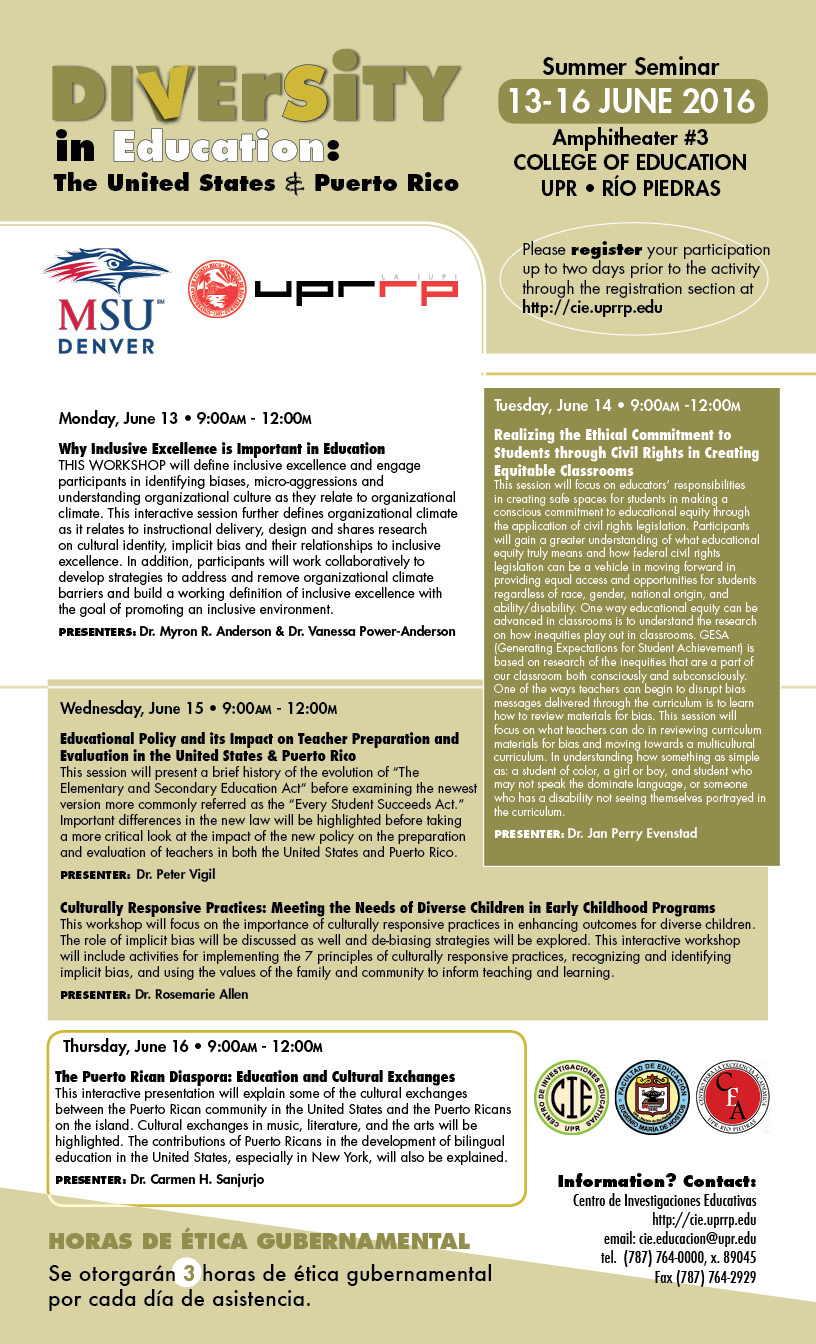Seminario de Verano: Diversity in Education

El Centro de Investigaciones Educativas les invita a participar del seminario de verano Diversity in Education: The United States and Puerto Rico, del lunes 13 al jueves 16 de junio de 2016, de 9:00 a.m. a 12:00 m., en el Anfiteatro #3 de la Facultad de Educación, UPR-Río Piedras. Las presentaciones versarán sobre los siguientes tópicos:
Monday, June 13 • 9:00am – 12:00m
Why Inclusive Excellence is important in Education
This workshop will define inclusive excellence and engage participants in identifying biases, micro-aggressions and understanding organizational culture as they relate to organizational climate. This interactive session further defines organizational climate as it relates to instructional delivery, design and shares research on cultural identity, implicit bias and their relationships to inclusive excellence. In addition, participants will work collaboratively to develop strategies to address and remove organizational climate barriers and build a working definition of inclusive excellence with the goal of promoting an inclusive environment.
Presenters: Dr. Myron R. Anderson & Dr. Vanessa Power-Anderson
Tuesday, June 14 • 9:00am -12:00m
Realizing the Ethical Commitment to Students through Civil Rights in Creating Equitable Classrooms
This session will focus on educators’ responsibilities in creating safe spaces for students in making a conscious commitment to educational equity through the application of civil rights legislation. Participants will gain a greater understanding of what educational equity truly means and how federal civil rights legislation can be a vehicle in moving forward in providing equal access and opportunities for students regardless of race, gender, national origin, and ability/disability. One way educational equity can be advanced in classrooms is to understand the research on how inequities play out in classrooms. GESA (Generating Expectations for Student Achievement) is based on research of the inequities that are a part of our classroom both consciously and subconsciously. One of the ways teachers can begin to disrupt bias messages delivered through the curriculum is to learn how to review materials for bias. This session will focus on what teachers can do in reviewing curriculum materials for bias and moving towards a multicultural curriculum. In understanding how something as simple as: a student of color, a girl or boy, and student who may not speak the dominate language, or someone who has a disability not seeing themselves portrayed in the curriculum.
Presenter: Dr. Jan Perry Evenstad
Wednesday, June 15 • 9:00am – 12:00m
Educational Policy and its Impact on Teacher Preparation and Evaluation in the United States & Puerto Rico
This session will present a brief history of the evolution of “The Elementary and Secondary Education Act” before examining the newest version more commonly referred as the “Every Student Succeeds Act.” Important differences in the new law will be highlighted before taking a more critical look at the impact of the new policy on the preparation and evaluation of teachers in both the United States and Puerto Rico.
Presenter: Dr. Peter Vigil
Culturally Responsive Practices: Meeting the Needs of Diverse Children in Early Childhood Programs
This workshop will focus on the importance of culturally responsive practices in enhancing outcomes for diverse children. The role of implicit bias will be discussed as well and de-biasing strategies will be explored. This interactive workshop will include activities for implementing the 7 principles of culturally responsive practices, recognizing and identifying implicit bias, and using the values of the family and community to inform teaching and learning.
Presenter: Dr. Rosemarie Allen
Thursday, June 16 • 9:00am – 12:00m
The Puerto Rican Diaspora: Education and Cultural Exchanges
This interactive presentation will explain some of the cultural exchanges between the Puerto Rican community in the United States and the Puerto Ricans on the island. Cultural exchanges in music, literature, and the arts will be highlighted. The contributions of Puerto Ricans in the development of bilingual education in the United States, especially in New York, will also be explained.
Presenter: Dr. Carmen H. Sanjurjo
Las presentaciones se impartirán en inglés.
Este seminario es libre de costo.
Para participar, deberá registrarse en la página de REGISTRO, en https://cie.uprrp.edu. Tiene hasta el jueves, 9 de junio de 2016 para registrarse.
SE OTORGARÁN TRES (3) HORAS DE ÉTICA GUBERNAMENTAL POR CADA DÍA DE ASISTENCIA A LAS PERSONAS QUE ASÍ LO SOLICITEN.
Este seminario es auspiciado por el Centro de Investigaciones Educativas, la Facultad de Educación de la UPR-Río Piedras, el Centro de Excelencia Académica, UPR-Río Piedras, y la Metropolitan State University of Denver, Colorado.
